2020年小升初六年级英语语法专项考点精讲+典题突破 专题03《一般将来时》(通用版含答案)
一般将来时讲义译林版六年级小升初语法专项复习

专题2 一般将来时讲义与练习(含答案)一、一般将来时定义一般将来时主要表示将来的动作或状态,在句子中由主语+be going to 来表达。
二、一般将来时关键词tomorrow(明天)、future (将来)、next ... (下一个...)、this afternoon(今天下午)、this evening(今天晚上)、soon(不久)……in two years(两天后)three days later (三天后)等三、结构1)结构一:will+动词原形(will可用于所有人称,shall只用于第一人称I和we)2)结构二:①主 +be going to+动原+ 其他.划提:What+ be + 主+going to do+ 其他?②主 +be going to+地点+ 其他.划提:Where + be + 主 +going+ 其他?3)用现在进行时be doing表示将来时:go, e, leave, 表示位置转移的动词例如:Uncle Wang is ing. 王叔叔就要来了。
专项练习一.用所给词的适当形式填空。
1、Today is a sunny day。
We (have)a picnic this afternoon。
2、My brother (go)to Shanghai next week。
3、Tom often (go)to school on foot。
But today is rainy, He (go)to school by bike。
4、What do you usually do at weekends?I usually (watch)TV and (catch)insects?5、It‘s Friday today。
What she (do)this weekend?She (watch)TV and (catch)insects。
6、What you (do)next Sunday?I (milk)cows。
2023年小学英语六年级小升初语法总复习(四)一般将来时 (译林版含答案)
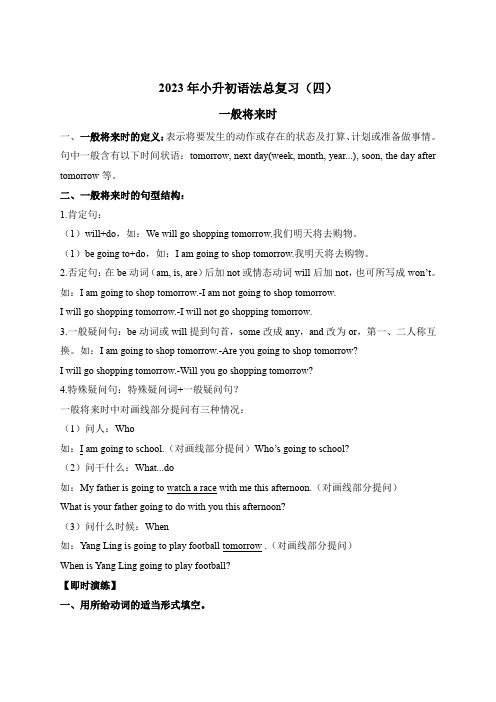
2023年小升初语法总复习(四)一般将来时一、一般将来时的定义:表示将要发生的动作或存在的状态及打算、计划或准备做事情。
句中一般含有以下时间状语:tomorrow, next day(week, month, year...), soon, the day after tomorrow等。
二、一般将来时的句型结构:1.肯定句:(1)will+do,如:We will go shopping tomorrow.我们明天将去购物。
(1)be going to+do,如:I am going to shop tomorrow.我明天将去购物。
2.否定句:在be动词(am, is, are)后加not或情态动词will后加not,也可所写成won’t。
如:I am going to shop tomorrow.-I am not going to shop tomorrow.I will go shopping tomorrow.-I will not go shopping tomorrow.3.一般疑问句:be动词或will提到句首,some改成any,and改为or,第一、二人称互换。
如:I am going to shop tomorrow.-Are you going to shop tomorrow?I will go shopping tomorrow.-Will you go shopping tomorrow?4.特殊疑问句:特殊疑问词+一般疑问句?一般将来时中对画线部分提问有三种情况:(1)问人:Who如:I am going to school.(对画线部分提问)Who’s going to school?(2)问干什么:What...do如:My father is going to watch a race with me this afternoon.(对画线部分提问)What is your father going to do with you this afternoon?(3)问什么时候:When如:Yang Ling is going to play football tomorrow .(对画线部分提问)When is Yang Ling going to play football?【即时演练】一、用所给动词的适当形式填空。
六年级下册英语课件小升初英语专题精讲动词一般将来时超全精编版全国通用

二、一般将来时的构成
1.由"be going to +动词原形"构成。
2.由"will/shall +动词原形"构成。
三、一般将来时的句型转换
Summary
1.否定句:在be动词(am,is, are)后加not或will/shall后加not构成won't/shan't。 2.一般疑问句:将 be动词或will/shall 提到句首,some改为any, and改为or,第一、第二人称互换。 3.特殊疑问句:由“疑问词+一般疑问句”构成。 shall、will与be going to的用法 1. shall用于第一人称,will用于第二、三人称。 2.在以I或we作主语的问句中,一般用shall,此时表示征求对方的意见或是询问一个情况。 3. be goingto表示根据主观判断将来肯定发生的事情,will表示客观上将来势必发生的事情。
Language points
一、一般将来时的概念及作用: 1.一般将来时表示将要发生的动作或情况。例如: 我明天将和我的表弟去游冰。 I will go swimming with my cousin tomorrow.
Language points
一、一般将来时的概念及作用: 1.一般将来时表示将要发生的动作或情况。例如例如: 他们下周将举行场运动会。 They will have a sports meet next week.
shall、will与be going to的用法 2.在以I或we作主语的问句中,一般用shall,此时表示征求对方的意见或是询问一 个情况。例如: 我们看电视好吗? Shall we watch TV? 我们明天有课吗? Shall we have any classes tormorrow?
小升初语法辨析一般现在时一般过去时一般将来时(讲义)人教PEP版英语六年级下册

小升初英语语法辨析:一般现在时、一般过去时、一般将来时&专项模拟练习一、一般现在时1.定义:表示经常发生的动作、存在的状态或普遍真理。
2.时间标志词:often(经常)、usually(通常)、always(总是)、sometimes(有时)、every day/week/month/year(每天/ 周/ 月/ 年)等。
3.结构:1.主语(非第三人称单数)+ 动词原形。
例如:You play basketball afterschool.(你放学后打篮球。
)2.主语(第三人称单数)+ 动词的第三人称单数形式。
例如:He playsbasketball after school.(他放学后打篮球。
)4.用法:1.表示经常性或习惯性的动作。
如:I go to school by bike every day.(我每天骑自行车去上学。
)2.表示现在的状态或特征。
如:She is tall and thin.(她又高又瘦。
)3.表示客观事实或普遍真理。
如:The earth moves around the sun.(地球绕着太阳转。
)二、一般过去时1.定义:表示过去某个时间发生的动作或存在的状态。
2.时间标志词:yesterday(昨天)、last week/month/year(上周/ 上个月/ 去年)、ago(……以前)、in + 过去的年份等。
3.结构:主语+ 动词的过去式。
例如:You played basketball yesterday.(你昨天打了篮球。
)4.用法:1.表示过去某个时间发生的动作。
如:I went to the park last Sunday.(我上周日去了公园。
)2.表示过去存在的状态。
如:He was happy yesterday.(他昨天很开心。
)三、一般将来时1.定义:表示将来某个时间要发生的动作或存在的状态。
2.时间标志词:tomorrow(明天)、next week/month/year(下周/ 下个月/ 明年)、in the future(在未来)等。
【口袋书】小升初英语语法知识点-一般将来时讲义(全国通用版)
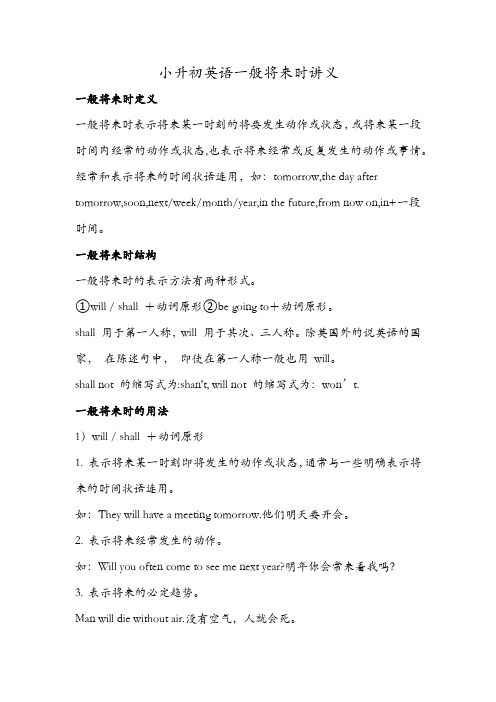
小升初英语一般将来时讲义一般将来时定义一般将来时表示将来某一时刻的将要发生动作或状态,或将来某一段时间内经常的动作或状态,也表示将来经常或反复发生的动作或事情。
经常和表示将来的时间状语连用,如:tomorrow,the day after tomorrow,soon,next/week/month/year,in the future,from now on,in+一段时间。
一般将来时结构一般将来时的表示方法有两种形式。
①will / shall +动词原形②be going to+动词原形。
shall 用于第一人称,will 用于其次、三人称。
除英国外的说英语的国家,在陈述句中,即使在第一人称一般也用will。
shall not 的缩写式为:shan't, will not 的缩写式为:won’t.一般将来时的用法1)will / shall +动词原形1.表示将来某一时刻即将发生的动作或状态,通常与一些明确表示将来的时间状语连用。
如:They will have a meeting tomorrow.他们明天要开会。
2.表示将来经常发生的动作。
如:Will you often come to see me next year?明年你会常来看我吗?3.表示将来的必定趋势。
Man will die without air.没有空气,人就会死。
2)be going to +不定式,表示将来。
"be going to"中的be是助动词,它有am, is, are三种形式,没有什么实际意义;to是动词不定式的标志词,标志词后动词用原形。
它们三个总是形影不离,在句中共同表达"方案、打算、预备去做……"的意思。
a. 主语的意图,即将做某事。
例如:What are you going to do tomorrow? 明天打算作什么呢?b. 方案,支配要发生的事。
小升初复习 一般将来时 一般过去时(素材)通用版英语六年级下册
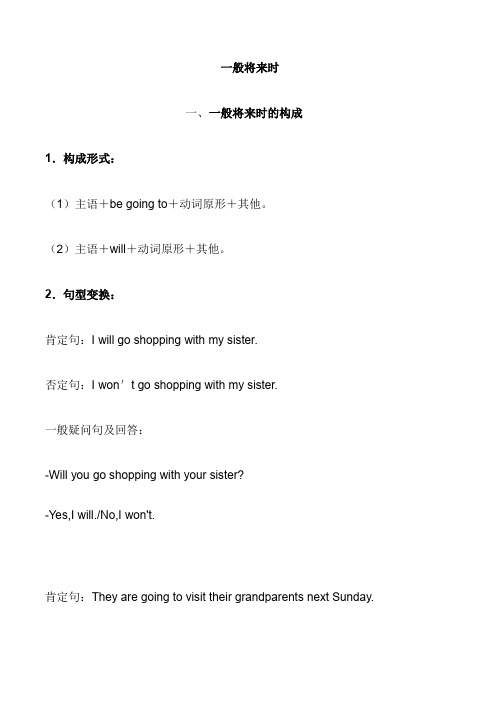
一般将来时一、一般将来时的构成1.构成形式:(1)主语+be going to+动词原形+其他。
(2)主语+will+动词原形+其他。
2.句型变换:肯定句:I will go shopping with my sister.否定句:I won't go shopping with my sister.一般疑问句及回答:-Will you go shopping with your sister?-Yes,I will./No,I won't.肯定句:They are going to visit their grandparents next Sunday.否定句:They aren’t going to visit their grandparents next Sunday.一般疑问句及回答:-Are they going to visit their grandparents next Sunday?-Yes,they are./No,they aren't.二、一般将来时的用法一般将来时表示将来某一时刻将要发生的动作或状态,成未来某一段时间内经常性的动作成状态,常与表示将来的时间状语连用,如:tomorrow,the day after tomorrow,soon,next week/month/year,in the future,from now on,in a few minutes/hours/days等。
1.表示将来某一时刻即将发生的动作或状态,通常与一些明确表示将来的时间状语连用。
如:They will play football next weekend. 他们将在下周末踢足球。
I will go with you tomorrow. 我明天将跟你走。
2.表示将来经常发生的动作。
如:I will often send you E-mail during summer holiday. 暑假期间我将经常给你发电子邮件。
小升初语法专题复习-一般将来时态(讲义)-人教PEP版英语六年级下册
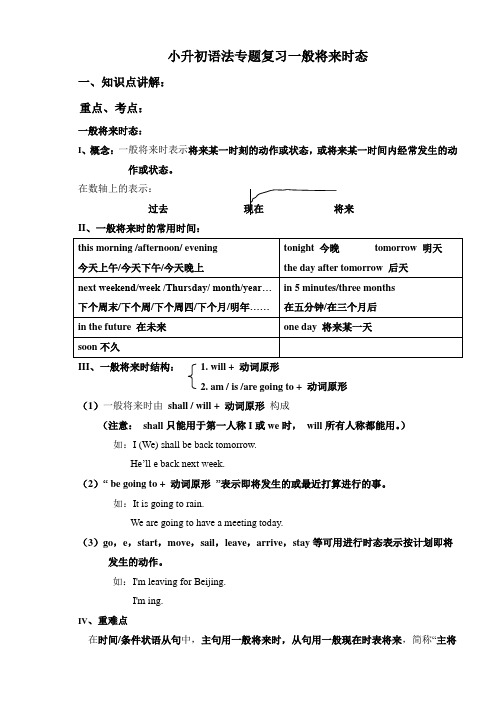
小升初语法专题复习一般将来时态一、知识点讲解:重点、考点:一般将来时态:I 、概念:一般将来时表示将来某一时刻的动作或状态,或将来某一时间内经常发生的动作或状态。
在数轴上的表示:过去现在 将来II 、一般将来时的常用时间:III 、一般将来时结构: 1. will + 动词原形2. am / is /are going to + 动词原形(1)一般将来时由 shall / will + 动词原形 构成(注意: shall 只能用于第一人称I 或we 时, will 所有人称都能用。
) 如:I (We) shall be back tomorrow.He’ll e back next week.(2)“ be going to + 动词原形 ”表示即将发生的或最近打算进行的事。
如:It is going to rain.We are going to have a meeting today.(3)go ,e ,start ,move ,sail ,leave ,arrive ,stay 等可用进行时态表示按计划即将发生的动作。
如:I'm leaving for Beijing.I'm ing.IV 、重难点在时间/条件状语从句中,主句用一般将来时,从句用一般现在时表将来,简称“主将从现”;常见的从句引导词为:when、if 、as soon as 等。
如:If it ________( not rain) tomorrow , we ________(go) to the park.I ________(be) a doctor when I ________(grow) up.I ________ (call) you as soon as he ________(e) back.V、一般将来时态与句型(**)(1)变为否定句:在be动词(am, is, are)后加not,或情态动词will后加not成won’t。
【小升初】英语专题复习-一般将来时3.ppt

• 9、春去春又回,新桃换旧符。在那桃花盛开的地方,在这醉人芬芳的季节,愿你生活像春天一样阳光,心情像桃花一样美丽,日子像桃子一样甜蜜。 2020/12/152020/12/15Tuesday, December 15, 2020
• 10、人的志向通常和他们的能力成正比例。2020/12/152020/12/152020/12/1512/15/2020 10:38:54 AM • 11、夫学须志也,才须学也,非学无以广才,非志无以成学。2020/12/152020/12/152020/12/15Dec-2015-Dec-20 • 12、越是无能的人,越喜欢挑剔别人的错儿。2020/12/152020/12/152020/12/15Tuesday, December 15, 2020 • 13、志不立,天下无可成之事。2020/12/152020/12/152020/12/152020/12/1512/15/2020
一般将来时小精灵
二、一般疑问句 这时候,小精灵模样是:Be(am,is,are)+主语+going to+ 动词原形+其它?如:
1. Are you going to read books tonight? —Yes, I am./—No, I am not. 2.Is he going to buy a comic book this morning? —Yes, he is./—No, he is not.
。2020年12月15日星期二2020/12/152020/12/152020/12/15
• 15、会当凌绝顶,一览众山小。2020年12月2020/12/152020/12/152020/12/1512/15/2020
• 16、如果一个人不知道他要驶向哪头,那么任何风都不是顺风。2020/12/152020/12/15December 15, 2020
一般将来时的知识点六年级(优秀范文5篇)

一般将来时的知识点六年级(优秀范文5篇)第一篇:一般将来时的知识点六年级知识是静态的,人有了知识,还应该明白如何正确地将所掌握的知识在实践中加以应用,没有智慧,充其量不过是一本记载着知识的书。
下面小编给大家分享一些一般将来时的知识点归纳六年级,希望能够帮助大家,欢迎阅读!一般将来时的知识六年级1.shall用于第一人称,常被will 所代替。
will 在陈述句中用于各人称,在征求意见时常用于第二人称。
Which paragraph shall I read first? 我先读哪一段呢?Will you be at home at seven this evening? 今晚七点回家好吗?2.be going to +不定式,表示将来。
a.主语的意图,即将做某事。
What are you going to do tomorrow? 明天打算作什么呢?b.计划或安排要发生的事。
The play is going to be produced next month。
这出戏下月开播。
c.有迹象要发生的事。
Look at the dark clouds, there is going to be a storm.看那乌云,快要下雨了。
3.be +不定式表将来,按计划或正式安排将发生的事。
We are to discuss the report next Saturday.我们下星期六讨论这份报告。
4.be about to +不定式,意为马上做某事。
He is about to leave for Beijing.他马上要去北京。
注意:be about to do 不能与tomorrow, next week 等表示明确将来时的时间状语连用。
5.一般现在时表将来。
a.下列动词come,go,arrive,leave,start,begin,return的一般现在时可以表示将来,主要用来表示在时间上已确定或安排好的事情。
小升初英语语法专题精讲学案 一般将来时(含答案)
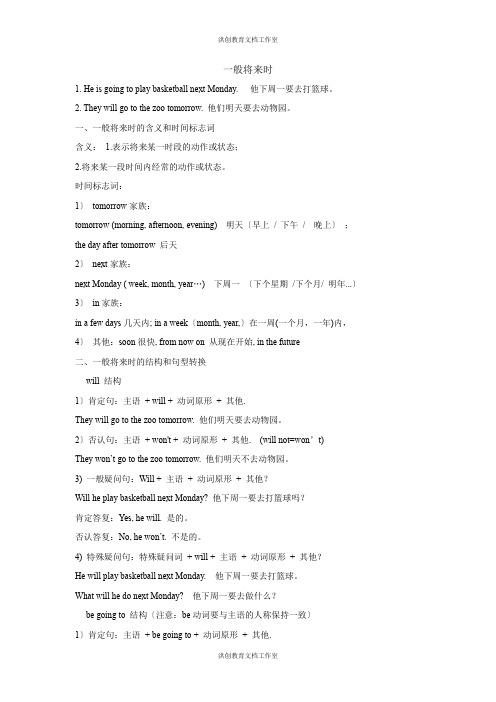
一般将来时1. He is going to play basketball next Monday. 他下周一要去打篮球。
2. They will go to the zoo tomorrow. 他们明天要去动物园。
一、一般将来时的含义和时间标志词含义:1.表示将来某一时段的动作或状态;2.将来某一段时间内经常的动作或状态。
时间标志词:1〕tomorrow家族:tomorrow (morning, afternoon, evening) 明天〔早上/ 下午/ 晚上〕;the day after tomorrow 后天2〕next家族:next Monday ( week, month, year…) 下周一〔下个星期/下个月/ 明年...〕3〕in家族:in a few days几天内; in a week〔month, year,〕在一周(一个月,一年)内,4〕其他:soon很快, from now on 从现在开始, in the future二、一般将来时的结构和句型转换will 结构1〕肯定句:主语+ will + 动词原形+ 其他.They will go to the zoo tomorrow. 他们明天要去动物园。
2〕否认句:主语+ won't + 动词原形+ 其他. (will not=won’t)They won’t go to the zoo tomorrow. 他们明天不去动物园。
3) 一般疑问句:Will + 主语+ 动词原形+ 其他?Will he play basketball next Monday? 他下周一要去打篮球吗?肯定答复:Yes, he will. 是的。
否认答复:No, he won’t. 不是的。
4) 特殊疑问句:特殊疑问词+ will + 主语+ 动词原形+ 其他?He will play basketball next Monday. 他下周一要去打篮球。
2023学年小学英语六年级下册语法专题突破-一般将来时牛津上海版(三起)
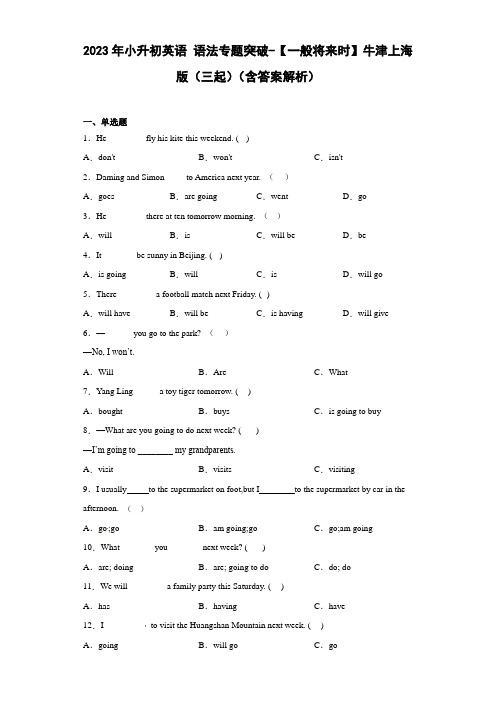
29.She ________ (make) a snowman this afternoon.
30.—What will you do today?
—Today we'll _________ (learn) some kung fu.
A.shall beB.will be
C.shall going to beD.will going to be
16.Look at those clouds. It ________ soon, I’m afraid. ()
A.rainsB.is rainingC.will rain
17.What is Mum going to cook ______? ()
42.There _________ (be) a dancing lesson tomorrow morning.
43.Jane ________ (buy) a birthday present for her mum this Sunday.
44.He will ________ (go) to the library after school.
31.Helen and Mike ____ (visit) their grandparents tomorrow.
32.She __________ (see) a film next weekend.
33.There __________ (be) a school concert next Monday.
3.Joe _______________(doesn’t/isn’t) have any sisters.
2020年小升初六年级英语语法专项考点精讲+典题突破 (10套合集)

小升初英语语法专项透析专题01《一般现在时》【考点精讲】【一般现在时】概念意义:一般现在时:指表示经常发生的事情,动作或存在的状态一般现在时的功能:1.表示事物或人物的特征、状态。
如:The sky is blue.天空是蓝色的。
2.表示经常性或习惯性的动作。
如:I get up at six every day.我每天六点起床。
3.表示客观现实。
如:The earth goes around the sun.地球绕着太阳转。
一般现在时的构成:1.be动词:肯定句:主语+be(am,is,are)+其它。
如:I am a boy. 我是一个男孩。
2.行为动词:肯定句:主语+行为动词(+其它)。
如:We study English.我们学习英语。
当主语为第三人称单数(he, she,it)时,要在动词后加"-s"或"-es"。
如:Mary likes Chinese.玛丽喜欢汉语。
动词+s的变化规则1.一般情况下,直接加-s,如:cook-cooks,2.以s. x. sh. ch. o结尾,加-es,如:guess-guesses, wash-washes, watch-watches, go-goes 3.以“辅音字母+y”结尾,变y为i, 再加-es,如:study-studies特殊:have----has一般现在时的变化:1.be动词的变化。
否定句:主语+ be + not +其它。
如:He is not a worker.他不是工人。
一般疑问句:Be +主语+其它。
如:-Are you a student? -Yes. I am. / No, I'm not.特殊疑问句:疑问词+一般疑问句。
如:Where is my bike?2.行为动词的变化。
否定句:主语+ don't( doesn't ) +动词原形(+其它)。
如:I don't like bread.当主语为第三人称单数时,要用doesn't构成否定句。
备战2020小升初英语语法知识点之一般将来时

备战2017小升初英语语法知识点之一般将来时小升初进入到紧张的备考阶段,对于想要择名校的孩子来讲小升初千万不要有偏科,英语是非常重视平时积累的一门课程,每天不间断的学习记忆,英语成绩才会有所提高。
下面为大家分享小升初英语语法知识点之一般将来时,希望大家认真学习!小升初英语知识点一般将来时一、概念:表示将要发生的动作或存在的状态及打算、计划或准备做某事。
句中一般有以下时间状语:tomorrow,nextday,soon,thedayaftertomorrow等。
二、基本结构:①begoingto+do;②will+do.三、否定句:在be动词l后加not或情态动词will后加not成wont。
例如:Imgoingtohaveapicnicthisafternoon.Imnotgoingtohaveapicnicthisafterno on.四、一般疑问句:be或will提到句首,some改为any,and改为or,第一二人称互换。
例如:Wearegoingtogoonanoutingthisweekend.Areyougoingtogoonanoutingthi sweekend?五、对划线部分提问。
一般情况,一般将来时的对划线部分有三种情况。
1.问人。
Who例如:ImgoingtoNewYorksoon.WhosgoingtoNewYorksoon.2.问干什么。
Whatdo.例如:Myfatherisgoingtowatcharacewithmethisafternoon.Whatisyourfathergoi ngtodowithyouthisafternoon.3.问什么时候。
When.例如:Shesgoingtogotobedatnine.Whenisshegoingtobed?六、同义句:begoingto=willIamgoingtogoswimmingtomorrow.=Iwillgoswimmingtomorrow.练习题:填空:1.我打算明天和朋友去野炊。
小升初复习-一般将来时态现在进行时态(讲义)通用版英语六年级下册
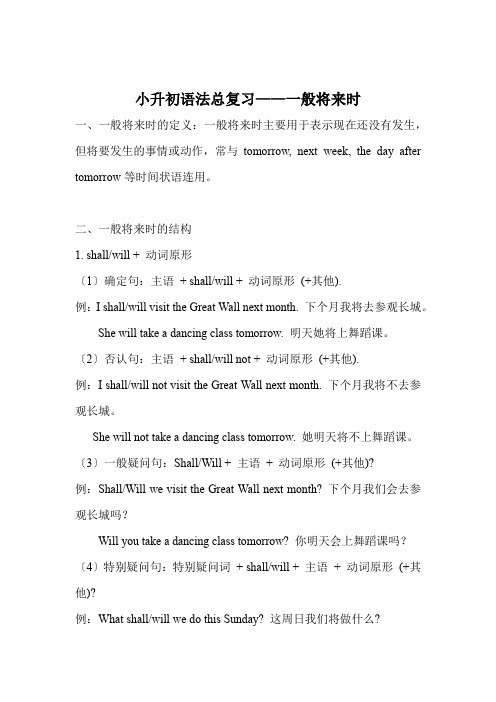
小升初语法总复习——一般将来时一、一般将来时的定义:一般将来时主要用于表示现在还没有发生,但将要发生的事情或动作,常与tomorrow, next week, the day after tomorrow等时间状语连用。
二、一般将来时的结构1. shall/will + 动词原形〔1〕确定句:主语+ shall/will + 动词原形(+其他).例:I shall/will visit the Great Wall next month. 下个月我将去参观长城。
She will take a dancing class tomorrow. 明天她将上舞蹈课。
〔2〕否认句:主语+ shall/will not + 动词原形(+其他).例:I shall/will not visit the Great Wall next month. 下个月我将不去参观长城。
She will not take a dancing class tomorrow. 她明天将不上舞蹈课。
〔3〕一般疑问句:Shall/Will + 主语+ 动词原形(+其他)?例:Shall/Will we visit the Great Wall next month? 下个月我们会去参观长城吗?Will you take a dancing class tomorrow? 你明天会上舞蹈课吗?〔4〕特别疑问句:特别疑问词+ shall/will + 主语+ 动词原形(+其他)?例:What shall/will we do this Sunday? 这周日我们将做什么?Where will he go tomorrow? 他明天将要去哪里?2. be going to + 动词原形〔1〕确定句:主语+ be going to + 动词原形(+其他).例:He is going to buy a bike. 他准备买一辆自行车。
〔2〕否认句:主语+ be not going to + 动词原形(+其他).例:He is not going to buy a bike. 他不准备买一辆自行车。
2020年六年级下册英语-小升初语法专项 一般将来时讲解
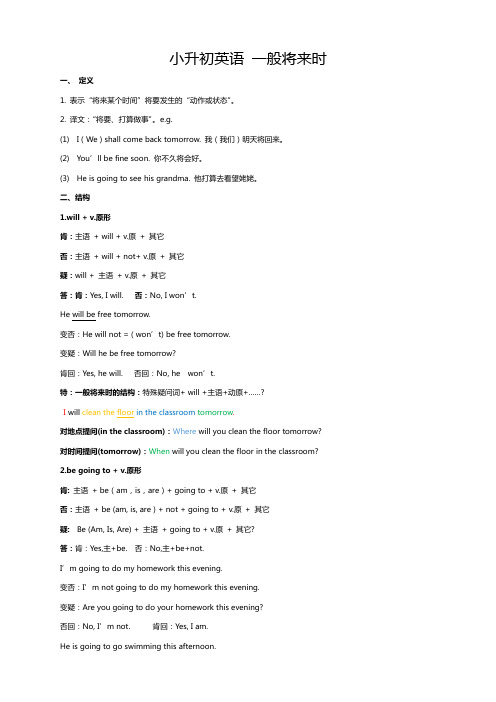
小升初英语一般将来时一、定义1. 表示“将来某个时间”将要发生的“动作或状态”。
2. 译文:“将要、打算做事”。
e.g.(1) I ( We ) shall come back tomorrow. 我(我们)明天将回来。
(2) You’ll be fine soon. 你不久将会好。
(3) He is going to see his grandma. 他打算去看望姥姥。
二、结构1.will + v.原形肯:主语+ will + v.原+ 其它否:主语+ will + not+ v.原+ 其它疑:will + 主语+ v.原+ 其它答:肯:Yes, I will. 否:No, I won’t.He will be free tomorrow.变否:He will not = ( won’t) be free tomorrow.变疑:Will he be free tomorrow?肯回:Yes, he will. 否回:No, he won’t.特:一般将来时的结构:特殊疑问词+ will +主语+动原+……?I will clean the floor in the classroom tomorrow.对地点提问(in the classroom):Where will you clean the floor tomorrow? 对时间提问(tomorrow):When will you clean the floor in the classroom?2.be going to + v.原形肯: 主语+ be(am,is,are)+ going to + v.原+ 其它否:主语+ be (am, is, are ) + not + going to + v.原+ 其它疑: Be (Am, Is, Are) + 主语+ going to + v.原+ 其它?答:肯:Yes,主+be. 否:No,主+be+not.I’m going to do my homework this evening.变否:I’m not going to do my homework th is evening.变疑:Are you going to do your homework this evening?否回:No, I’m not. 肯回:Yes, I am.He is going to go swimming this afternoon.变否:He is not going to go swimming this afternoon.变疑:Is he going to go swimming this afternoon?特:特殊疑问词+ be (am, is, are) + 主语+ going to + v.原+ 其它? (除对主语提问)I am going to clean the classrooms in the school tomorrow morning.(1) 对主语提问:Who is going to clean the classrooms in the school tomorrow morning?(2) 对谓宾提问:What are you going to do in the school tomorrow morning?(3) 对宾语提问:What are you going to clean in the school tomorrow morning?(4) 对地点提问:Where are you going to clean the classrooms tomorrow morning?(5) 对时间提问:When are you going to clean the classrooms in the school?补充:There be句型将来结构:1.There is going to be…There are going to be…(be动词根据就近原则)如:There is going to be a meeting this evening.There are going to be two meetings this evening.2.There will be… There will be a meeting this evening.三、标志性时间状语1.today系列:today, this afternoon/evening今天下午/晚上;tonight今天夜里(除了this morning, 一般用于过去时)2. tomorrow系列:tomorrow;tomorrow morning/afternoon/evening明天早/下/晚;the day after tomorrow后天3.next系列:next week下周;next Monday /month/year下周一/下个月/明年4. in + 一段时间系列in + 一段时间:用于将来时,要翻译成“……时间之后”,而不能翻译为“……时间之内”in three days’ time = in three days三天后;Lily will come back in two hours.5. soon不久;in future今后;in the future在将来;。
2020年小升初六年级英语语法专项考点精讲+典题突破 专题03《一般将来时》(通用版含答案)
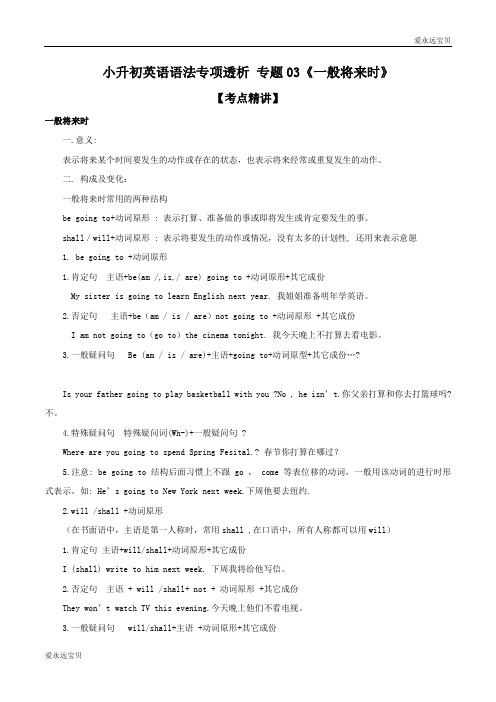
小升初英语语法专项透析专题03《一般将来时》【考点精讲】一般将来时一.意义:表示将来某个时间要发生的动作或存在的状态,也表示将来经常或重复发生的动作。
二. 构成及变化:一般将来时常用的两种结构be going to+动词原形 : 表示打算、准备做的事或即将发生或肯定要发生的事。
shall/will+动词原形 : 表示将要发生的动作或情况,没有太多的计划性, 还用来表示意愿1. be going to +动词原形1.肯定句主语+be(am /,is,/ are) going to +动词原形+其它成份My sister is going to learn English next year. 我姐姐准备明年学英语。
2.否定句主语+be(am / is / are)not going to +动词原形 +其它成份I am not going to(go to)the cinema tonight. 我今天晚上不打算去看电影。
3.一般疑问句Be (am / is / are)+主语+going to+动词原型+其它成份…?Is your father going to play basketball with you ?No , he isn’t.你父亲打算和你去打篮球吗?不。
4.特殊疑问句特殊疑问词(Wh-)+一般疑问句 ?Where are you going to spend Spring Fesital.? 春节你打算在哪过?5.注意: be going to 结构后面习惯上不跟 go , come 等表位移的动词,一般用该动词的进行时形式表示。
如: He’s going to New York next week.下周他要去纽约.2.will /shall +动词原形(在书面语中,主语是第一人称时,常用shall ,在口语中,所有人称都可以用will)1.肯定句主语+will/shall+动词原形+其它成份I (shall) write to him next week. 下周我将给他写信。
小升初英语课件-核心考点题型专项突破专题04时态第三讲一般将来时全国通用版
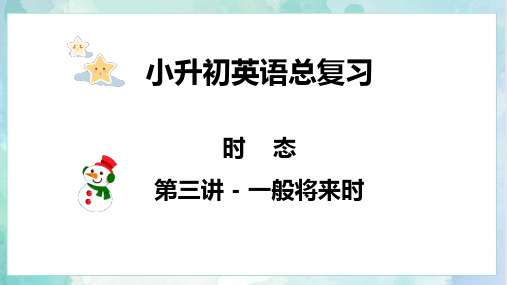
例题精讲
【例10】句型转换 They clean the classroom every day. ( tomorrow 代 every day) They _____ ______ the classroom tomorrow.
思路点拨:句意:他们每天打扫教室。这是一般现在时的句子.用 tomorrow代替every day后该用一般将来时态。 答案:will clean
考点一 一般将来时的用法
考点一 一般将来时的用法
3. be going to do的用法 (1)表示计划、打算、准备做的事
e.g. We are going to have a meeting to discuss the matter this evening. 今晚开会讨论这件事情。
(2)表示即将发生或肯定要发生的事, e.g. It is going to rain.要下雨了。
例题精讲
【例12】句型转换 He will leave Chongqing in two days. (对划线部分提问) ______ _______ will he leave Chongqing ?
思路点拨:两天后他要离开重庆。划线部分表示时间,两天后,对其提问可 用how soon引起问句。所以可在改写后句子的空白处填写How soon。
例题精讲
【例15】 -Will Bob study in the USA next year? (补全定答语) -Yes, _______ _______.
思路点拨:-一鲍勃明年将在美国学习吗?是的,他将要在美国学习。题干 是一般将来时态,will是助动词,肯定回答中必须出现will, Bob在答语中要 用he来替代,故答案为(1). he (2). will.
- 1、下载文档前请自行甄别文档内容的完整性,平台不提供额外的编辑、内容补充、找答案等附加服务。
- 2、"仅部分预览"的文档,不可在线预览部分如存在完整性等问题,可反馈申请退款(可完整预览的文档不适用该条件!)。
- 3、如文档侵犯您的权益,请联系客服反馈,我们会尽快为您处理(人工客服工作时间:9:00-18:30)。
小升初英语语法专项透析专题03《一般将来时》【考点精讲】一般将来时一.意义:表示将来某个时间要发生的动作或存在的状态,也表示将来经常或重复发生的动作。
二. 构成及变化:一般将来时常用的两种结构be going to+动词原形 : 表示打算、准备做的事或即将发生或肯定要发生的事。
shall/will+动词原形 : 表示将要发生的动作或情况,没有太多的计划性, 还用来表示意愿1. be going to +动词原形1.肯定句主语+be(am /,is,/ are) going to +动词原形+其它成份My sister is going to learn English next year. 我姐姐准备明年学英语。
2.否定句主语+be(am / is / are)not going to +动词原形 +其它成份I am not going to(go to)the cinema tonight. 我今天晚上不打算去看电影。
3.一般疑问句Be (am / is / are)+主语+going to+动词原型+其它成份…?Is your father going to play basketball with you ?No , he isn’t.你父亲打算和你去打篮球吗?不。
4.特殊疑问句特殊疑问词(Wh-)+一般疑问句 ?Where are you going to spend Spring Fesital.? 春节你打算在哪过?5.注意: be going to 结构后面习惯上不跟 go , come 等表位移的动词,一般用该动词的进行时形式表示。
如: He’s going to New York next week.下周他要去纽约.2.will /shall +动词原形(在书面语中,主语是第一人称时,常用shall ,在口语中,所有人称都可以用will)1.肯定句主语+will/shall+动词原形+其它成份I (shall) write to him next week. 下周我将给他写信。
2.否定句主语 + will /shall+ not + 动词原形 +其它成份They won’t watch TV this evening.今天晚上他们不看电视。
3.一般疑问句will/shall+主语 +动词原形+其它成份Will you stay at home with us tomorrow ?明天你和我们呆在家里好吗?4.特殊疑问句特殊疑问词(Wh-) +一般疑问句When will your father be back? 你爸爸什么时侯回来?三、附 :Shall I /we …常用来征求对方意见,而问对方是否愿意,或者表示客气的邀请,常用Will you…?他们的回答比较灵活。
1.Shall we go to the park ?肯定Sure , let’s go .否定 No , let’s go to the cinema.2.Will you please come to my birthday party next week ?肯定Yes, I will. / Sure .否定 I’m sorry. I’m afraid I can’t.四、时间标志:tomorrow , soon , next Monday , next year , next weekend , this afternoon , this evening ……【典题突破】一、单选题(共10题;共20分)1.It will________ in Beijing.A. snowB. snowingC. be snow2.It will________ in Hangzhou.A. sunnyB. sunC. be sunny3.It's going to________.A. rainingB. rainC. rained4.Li Ming is getting ready ________home next week.A. goB. to goC. goes5.We will go to BeijingA. next weekB. last weekC. every week6.What time will the meeting ________?A. beginB. beginsC. beginning7.In the future, school will ____ different.A. isB. areC. be8.I'm going to ________ next week.A. take a tripB. seeing a filmC. draws pictures9.We are also________ to start new lessons.A. goesB. goingC. go10.—Are you going to ________ home at five o'clock?—Yes,I am.A. beB. isC. are二、填空题(共10题;共17分)11.You are a wonderful friend. I will come back to ________(Chinese) sometime.12.Thur.It will ________ on Thursday. My parents and I________.13.Where are they going?________14.匹配题。
⑴Li Ming will fly to China. ________ A.⑵In spring,I like to ride a bike.________ B.⑶My grandfather reads a book in the evening.________ C.⑷Don't play in class.________ D.⑸We will learn about plants in the forest.________ E.15.We ________(visit) the farm next week.16.It will ________(cloudy)tomorrow .17.Fri.It will ________ on Friday. I ________.18.________(one) I'll finish my homework, and then I'll clean my room.19.Tomorrow is sunny. We________(have) a picnic in the park.20.Tom ________ (go) to plant trees next day. He ________ (go) to plant trees every year.三、句型转换(共10题;共25分)21.She had an Art lesson this morning .(用tomorrow morning改写句子)She is ________ ________ ________ an Art lesson tomorrow morning.22.Miss Li often buys things from shops.(用be going to 改写句子)Miss Li ________ going to ________ things from shops.23.I will go fishing this weekend. (改为否定句)I________ ________ ________fishing this weekend.24.I'll cook fish. (改为一般疑问句)________ you ________ fish?25.Mike is going to take a gift tomorrow. (对划线部分提问)________ is Mike going to ________ tomorrow?26.The party is going to begin at six this evening. (对划线部分提问)________ ________ the party going to________ this evening?27.I'm going to read books this evening. (改为一般疑问句并做否定回答)________ you________ ________read books this evening?No, ________ ________.28.We will go to the supermarket this aftermoon.(把this afternoon改为every afternoon) We ________ ________ the supermarket every afternoon.29.They are going to have a birthday party this weekend. (改为同义句)They ________ ________a birthday party this weekend.30.He buys a book for his brother. (加上tomorrow,改写句子)________四、选词填空(词汇运用)(共5题;共5分)31.They ________(go/ will go ) on a trip to Beijing next week.32.________ (There/What) will be a new film tomorrow.33.We will ________ (have/has) the sale on the playground.34.I'll only ________ (use/useful) it to make phone calls and learn English.35.I'm going to ________(read/reads)a word book.五、语法填空(共8题;共10分)36.Kitty is arriving on Sunday, the ________ (five) of January.37.She ________(make)a snowman this afternoon.38.Nancy________ (take) part in a sports meeting next week.39.We are ________ (go) to get there at five.40.We________(buy) some delicious food tomorrow. What about you?41.— What's she going to________(be)?— She is going to be a________(sing).42.I'm ________ see a film ________(下周).43.They are going to ________(go)for a picnic.六、翻译(共5题;共23分)44.他将去图书馆寻找一些关于澳大利亚的一些书。
